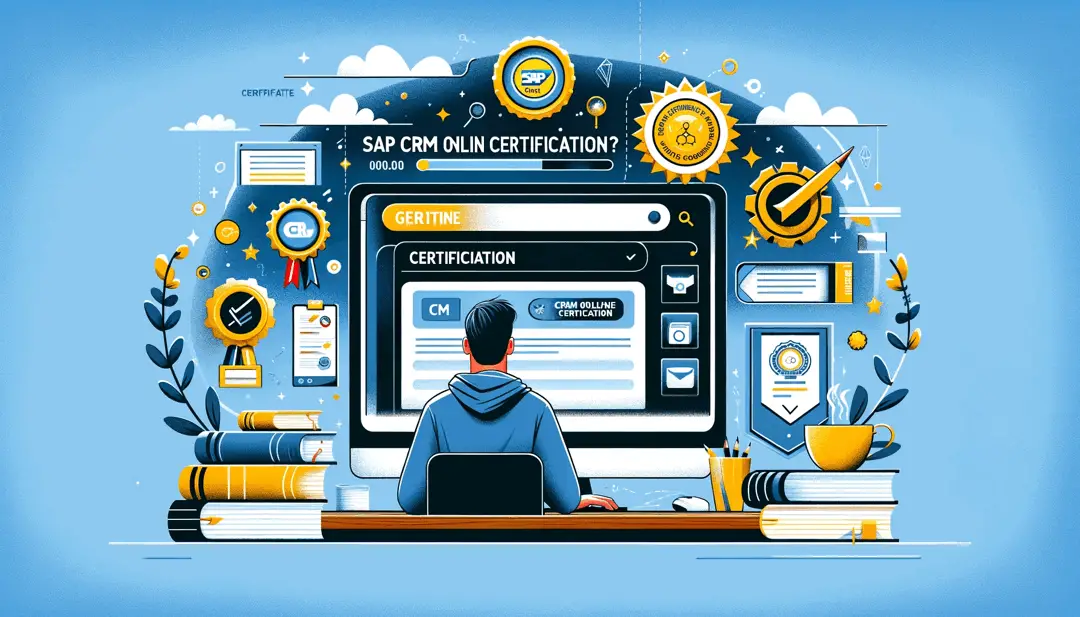How to get an SAP CRM Online certification?
- All About SAP Certification
- What is SAP Certification
- SAP Certification Eligibility: Undemy and Michaelmanagement Courses Offered
- Benefits of SAP Certification
- Who can be SAP certified? At what levels? And in what areas of focus?
- Online course from Michael Management Sales Specialist SAP
- 1. Basic skills. Lay the foundation for your learning path with these core skills courses to better understand the core curriculum below.
- 2. Core curriculum. Complete these advanced training courses for your learning path to earn your certification badge.
- 3. Expand your skills. Take these advanced advanced courses to keep up with your learning path and keep earning skill points and certifications.
- Frequently Asked Questions
- Comments (1)
SAP certification consists in conducting special testing, after which a person becomes a certified specialist in working with various SAP solutions and methodologies.
SAP certification is a testament to high competence and practical experience with SAP solutions. For employers, it gives confidence that they are facing a professional of the highest level, and for SAP specialists it is a generally accepted and understandable confirmation of their skills and abilities.
There are three levels of certification: basic, basic and advanced. The certificate is valid for ten years from the date of testing. Forms for passing the exam are face-to-face and cloud. In-person is conducted at the SAP Learning Center, while cloud testing is available at the SAP Cloud Certification Hub.
All About SAP Certification
SAP stands for System Applications and Products and was originally aimed at enabling customers to interact with a common database across a wide range of applications. Gradually more applications began to be assembled, and today SAP is used by leading companies such as Microsoft and IBM.
In fact, SAP was founded by five IBM employees in 1972 from Mannheim, Germany. SAP applications have undergone various changes and modifications, and the latest version of R/3 (Business Applications from SAP) provides tremendous opportunities for managing financial assets, manufacturing operations, plants, personnel, materials, archived documents, and cost accounting.
What is SAP Certification
Once you become SAP certified, you will have the option to obtain various module certifications. To better understand which topics are important for your certification, you should review the syllabus. On the certification site, you can find an overview of related topics.
Before your SAP certification exam, check out the Training and Certification Options Store, which offers a wide range of training options to meet your training needs, including training courses.SAP is constantly adding new e-business applications, web interfaces, supply chain management, customer relationship management tools, and more to its products. SAP systems consist of various fully integrated modules covering almost every aspect of business management.
SAP today is a globally recognized platform in various functional areas, including:
- Financial accounting and controlling;
- Production planning;
- Management of material flows.
Demand for SAP knowledge is growing in manufacturing enterprises where managers work, and companies offer a wide range of SAP-supported modules.
SAP Certification Eligibility: Undemy and Michaelmanagement Courses Offered
SAP consists of many courses and modules. Eligibility depends on which SAP course you are interested in and the skills he/she has. It is recommended that the candidate has a relevant academic background in subjects such as Computer Science, Business Administration, Finance, Accounting, Human Resources, Information Systems, Operations Management and Systems Engineering.
The SAP Certification is divided into two types of courses, one is more functional and the other is a technical format. However, both courses present the same authorization and transaction codes associated with your education. In addition, course content can vary greatly depending on the nature of the course.
Technical SAP certification is more focused on programming and customizing modules:
- Roles and powers SAP ERP - $13.99 - $19.19;
- SAP Debugger for Consultants - $13.99 - $19.19;
- Detailed course on SAP QUERY - $ 13.99 - $ 19.19;
- How to set up work schedules in SAP - $13.99 - $19.19.
This is further complemented by roles that combine both functional and technical skills, including the duties of analysts. If you have programming/development/programming experience, technical courses are recommended.
There are no specific courses or sets of courses that must be taken before taking the certified exam. However, if you are applying for a higher level professional certificate, you must have an associate's certificate.
SAP certifications help validate the knowledge and experience of SAP partners, software users, customers and professionals who want to work in the SAP environment. Certification is recognized worldwide and is a standardized criterion for several roles and responsibilities.
Benefits of SAP Certification
SAP is one of the most sought after certifications in the current business environment. IT professionals familiar with SAP platforms are in demand all over the world and it has been one of the most successful IT certifications recently. SAP implementation is a complex process that requires appropriate knowledge and training.
It takes a professional years of experience to gain the necessary knowledge. This is also the reason why modern companies turn to SAP Certified Professionals.
Who can be SAP certified? At what levels? And in what areas of focus?
SAP announced three levels of certification: junior, professional and master. Associate and professional level exams are currently available. The master level is still in development.
On the SAP website, these levels are defined as follows:
- Associate This certification covers the fundamental knowledge requirements of a SAP consultant, ensuring the successful acquisition of extensive knowledge and skills in SAP solutions.
- Professional Level This advanced certification requires proven project experience, knowledge of business processes and a more detailed understanding of SAP solutions.
- Master “This certification, under development, includes demonstrating an expert level understanding of a specific area of SAP software and the ability to drive innovation and solution optimization through deep knowledge and vision. Certification at this level requires extensive experience in project delivery, in-depth knowledge of SAP products, and the ability to create the future of IT vision in complex project environments.”
The junior specialist level tests the knowledge of the test book. In most cases, this level does not require SAP implementation experience to pass the exams. The questions on the professional level exams are designed to test the test taker's experience in SAP.
SAP points out that you do not need to take the Associate Exam before taking the Professional Exam. So you can choose which level you think you are qualified for and take that exam.
SAP also introduced three main areas: applications, technology and development. All three levels of certification fall under three main areas and are designed to help you find the right certification that is right for you.
On the SAP website, these main areas are defined as follows:
- Addendum: You may take the Certified Exam after completing an appropriate Solution Academy course and case study or an equivalent SAP standard study program.
- Technology: If you complete a solution academy or SAP training courses, you can take a technology exam to earn a certification.
- Development: This certificate is available to individuals who develop an application for SAP solutions.
Online course from Michael Management Sales Specialist SAP
This course has a total duration of 26 hours. The user can get unlimited access to all courses for one year for $1500, or choose a subscription to basic courses, which costs $1573.
The course has several modules:
1. Basic skills. Lay the foundation for your learning path with these core skills courses to better understand the core curriculum below.
- SAP S/4 HANA Basic navigation - suitable for beginners, lasts three hours;
- SAP S/4 HANA SAP Intermediate Skills - suitable for beginners, lasts five hours;
- SAP HANA S/4 HANA Basic reporting skills - suitable for beginners, lasts 3.5 hours;
- SAP S/4 HANA Intermediate Reporting Skills - Suitable for beginners, lasts four hours.
2. Core curriculum. Complete these advanced training courses for your learning path to earn your certification badge.
- SAP CRM - Sales Specialist. Suitable for beginners, lasts 6.5 hours;
- SAP CRM - Sales Manager. Suitable for beginners, lasts three hours;
- CRM Marketing Resource Management. Suitable for intermediate-level professionals, it takes place under the guidance of an instructor and lasts one hour.
3. Expand your skills. Take these advanced advanced courses to keep up with your learning path and keep earning skill points and certifications.
- The source for payment in S/4 HANA is the material management module. Suitable for mid-level professionals, takes place under the guidance of an instructor and lasts 3.5 hours;
- 3 MM attributes to improve customer service and productivity. Suitable for intermediate-level specialists, takes place under the guidance of an instructor and lasts 1.5 hours;
- Configuration 2 - S/4 HANA material management module. Suitable for mid-level professionals and takes place under the guidance of an instructor. Lasts 3.5 hours;
- Configuration 1 - S/4 HANA material management module. Suitable for mid-level professionals and takes place under the guidance of an instructor. Lasts four hours;
- Property management in SAP. Suitable for beginners, but conducted under the guidance of an instructor. Duration - 50 hours.
Frequently Asked Questions
- What are the key considerations for professionals transitioning from traditional CRM roles to SAP CRM?
- Professionals should consider the differences in system architecture, the specific functionalities of SAP CRM, and how these align with their career goals and existing skills.

